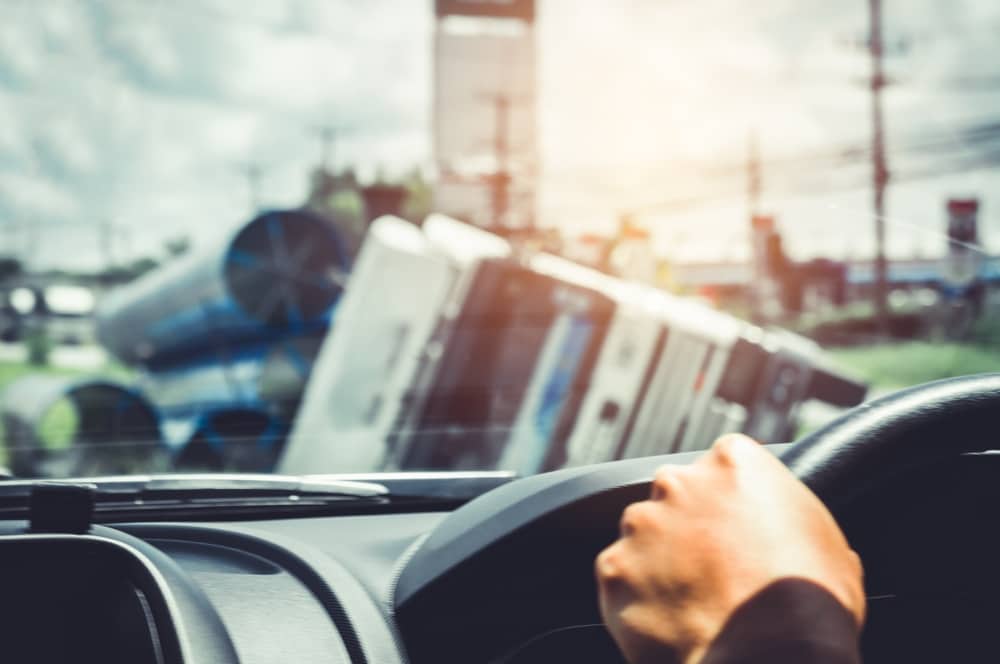Encountering a big truck on the road is an everyday occurrence for most drivers. Trucks serve as the backbone of the economy, transporting materials and delivering goods in every corner of the country. But despite their usefulness, big trucks also pose a significant accident risk. In a crash, a large truck can cause widespread destruction and numerous injuries or fatalities.
Here is a review of common types of truck accidents, and how an experienced truck accident lawyer can get you the compensation you need to heal and rebuild after getting hurt in a truck crash.
Blind Spot Accidents
Big trucks have large blind spots on all four sides. Truckers cannot see these areas — not even with their mirrors—while sitting in their normal driving position. Vehicles, people, and objects in a truck’s blind spot are effectively invisible to the truck driver, unless a truck carries blind spot cameras, radar, or a similar warning system. As a rule of thumb: you are in a truck’s blind spot if you cannot see the driver or the driver’s reflection in the truck’s rear view mirrors.
Truckers know their rig’s blind spots and, if they’re paying close attention, can keep track of vehicles as they enter and exit them. Blind spot accidents happen when truck drivers lose that situational awareness and merge or turn without ensuring their blind spots are empty.
Common blind spot accidents include:
- Merging into a lane occupied by another vehicle;
- Turning across a lane occupied by another vehicle;
- Driving over a sidewalk or roadside object;
A blind spot accident can result in severe damage to the other vehicle and significant injury to the passengers inside. In the worst case, a blindspot collision can crush another vehicle in a catastrophic underride (see below).
Wide Turn Accidents

Big trucks often need to make wide turns to navigate a corner successfully. Truck drivers make wide turns to enable them to see more of the road and, in the case of right turns especially, to avoid leaving the road.
Other drivers, however, do not always realize the truck driver’s need or intention to make a wide turn. As a result, they may occupy the area of the road the wide-turning truck will soon drive into, risking a dangerous collision. The risk of an accident is especially high if other motorists hide in a truck’s blind spot as it turns wide.
Wide turn accidents can cause considerable crushing damage to the other vehicle involved, including causing severe injury to the vehicle’s occupants.
Jackknife Accidents
Jackknife accidents occur when a trailer swings forward against the tractor vehicle towing it, like the blade of a folding knife. In a jackknife accident, the driver usually loses control of the trailer, and the rig slides sideways down the road until tire friction, a collision, or something else stops it.
Jackknife accidents can occur in a variety of circumstances. Contributing factors can include the weight of the trailer, the effectiveness of the tractor truck’s braking system, unbalanced cargo loads, sudden braking or swerving, speeding, slippery roads, and high winds.
A jackknife accident carries a high risk of multiple collisions with other vehicles. Trucks that jackknife may also roll over or spill their cargo. For those reasons, jackknife accidents tend to cause numerous injuries and widespread property damage.
Rollover Accidents
Trucks roll over more easily than other vehicles because they have a relatively high center of gravity, especially their trailers.
Numerous triggering events can lead to a truck rollover, including:
- Navigating a sharp turn at unsafe speed;
- A wheel slipping off the road onto a soft shoulder;
- Strong crosswinds;
- An uneven or sloped road surface;
- A jackknife accident;
- A collision with another vehicle;
- Swerving and similar emergency maneuvers;
- Sliding on a slippery road;
- A sudden shift or imbalance in the trailer’s cargo load;
- A tire blowout at high speed.
Any truck rollover accident holds the potential to cause property damage, injuries, and fatalities. Rollovers kill truck drivers more often than any other truck crash, for example. Big trucks and trailers can also easily crush smaller vehicles beneath them, leading to severe injury or death for the smaller vehicle’s occupants.
Underride Accidents
In an underride truck accident, a smaller vehicle behind or beside a big truck gets trapped or wedged under the truck trailer, causing severe damage and injuries. Underride accidents can happen when a truck driver changes lanes without first checking his blind spots, effectively running over a smaller vehicle. They can also happen when a truck comes to a sudden or unexpected stop and a vehicle rear ends its trailer.
An underride accident can crush a smaller vehicle or shear off its roof. Frequently, this results in severe injury or death to the smaller vehicle’s occupants.
Tire Blowouts
Tire blowouts occur when a tire suddenly and catastrophically loses pressure. On a big truck, they’re commonly caused by a puncture or a tire bearing too much weight. Tire blowouts can also occur if a trucking company fails to replace worn tires.
On average, truck tires last between 25,000 and 75,000 miles. If a truck is not driven frequently, tires need replacing every 3-6 years. A tire that sits still for long periods can decompose due to dry rot, which may cause a tire blowout accident when the truck returns to the road.
A tire blowout can cause a semi-truck driver to lose control. Even though a semi-truck has multiple tires to hold the road, a single tire blowing out can lead to a cascade of dangerous events. It may cause the driver to swerve before regaining control, or hinder the driver’s ability to bring the truck to a safe stop. Any of these events can lead to an accident.
Tire blowouts also frequently leave remnants of the damaged tire on the road. These so-called road gators can also create dangerous obstacles that spawn accidents when drivers swerve to avoid them.
Rear End Collisions
Trucks need more room to slow and stop than passenger vehicles. In heavy traffic conditions, truckers must pay extra care to leave enough space to slow for vehicles stopping in front of them. If they leave themselves inadequate room, they risk rear-ending smaller vehicles, causing extreme damage and catastrophic injuries.
Rear end collisions involving trucks can also lead to chain reaction collisions involving multiple vehicles. The resulting pileup creates an extreme hazard for other motorists and can trigger a slew of catastrophic, fatal crashes in a short period of time.
Spilled Cargo Accidents
Truck drivers must take care not to risk spilling their cargo. That may require them to supervise or inspect how cargo is loaded, secure and re-secure cargo on a flatbed, or ensure that the doors of a trailer remain shut and locked.
A falling load can cause significant harm in numerous ways. The load may fall off the trailer directly onto a vehicle. It could spill on the road and cause a dangerous obstruction, damage to the road surface, or slippery conditions. Flammable or toxic cargo could ignite a fire or endanger surrounding communities.
Distracted Driving Accidents
Truck drivers spend long hours on the road every day. It can be monotonous work.
Some truckers succumb to dangerous distractions behind the wheel, such as:
- Interacting with screens, such as a smartphone or GPS
- Eating and drinking
- Daydreaming
- Talking to passengers or on the phone
Distracted driving poses a danger for any driver, but it’s especially dangerous for truckers operating large, complex vehicles. A distracted truck driver risks causing any of the collisions listed above, putting himself and others on the road with him in danger.
Drowsy Driving Accidents
Driver fatigue is a major concern for the trucking industry. Despite numerous state and federal regulations mandating regular rest time for truck drivers, a large proportion of truckers routinely fail to get a healthy amount of quality sleep, which. endangers them and anyone else with whom they share the road.
Drowsy driving is as dangerous as drunk driving—fatigue impairs driving ability in the same manner as drinking alcohol. A drowsy trucker struggles with poor motor control, a limited attention span, bad decision-making, and difficulties judging speed and distance. Any of these deficits can all too easily lead to a deadly truck accident.
Alcohol or Drug Impaired Driving Accidents
A significant number of truck drivers struggle with substance abuse. Long hours, isolation, or relatively poor health can lead many truckers to turn to drugs and alcohol as a means of escape or to stay alert behind the wheel.
Strict laws prohibit truck drivers from drinking within four hours of driving, but that does not necessarily stop drunk truck drivers from doing so. Truckers also frequently consume legal and illegal stimulants to keep themselves awake during long hours on the road. Any intoxicating substance can interfere with a driver’s abilities and create an extreme risk of a catastrophic truck crash.
Speed-Related Accidents
Speeding in any vehicle can substantially increase the odds of a dangerous collision and the severity of victims’ injuries. Trucks are no exception. In fact, numerous factors can encourage truckers to push speed limits and to take risks with their own and others’ safety.
Some truck drivers get paid by the mile, so speeding can increase their pay. Many frequently contend with tight delivery deadlines. When bad weather, traffic jams, or accidents slow them down, speeding may be the only way to make up time.
A speeding truck, however, endangers everyone on the road. Truck drivers who speed have shorter reaction times and longer stopping distances, both of which heighten the risk of a deadly collision.
Compensation for Truck Accidents
Victims of truck accidents generally have the right to claim compensation for their injuries and losses from the parties at-fault for causing a truck crash and their liability insurers.
Compensation for a truck crash can include payment for:
- Medical and other out-of-pocket expenses
- Lost past and future earnings
- Physical pain and emotional suffering
- Loss of quality of life
- Punitive damages (in some cases)
Obtaining that compensation, however, is not always easy or straightforward. Truck accidents tend to cause widespread destruction and injuries. Multiple victims may have claims for damages against multiple individuals, businesses, and insurance companies. Legal maneuvering to secure payments or avoid liability can begin immediately after an accident.
That’s why, in the aftermath of a crash, injured victims need an experienced truck accident lawyer on their side as soon as possible. A lawyer’s job is to ensure that victims’ truck accident claims get heard, acknowledged, and promptly paid by the parties at fault and their insurers. Without a lawyer fighting for them, victims risk missing out on substantial payments that could help them cover the cost of care and support them as they heal from their injuries.
All reputable truck accident lawyers offer free, no-obligation consultations for truck crash victims. Most also represent victims on a contingent fee basis, which means the lawyers only receive a fee if they deliver results. (Required Disclaimer: victims may have to pay opposing parties’ court fees and costs in the event of a loss.) Connecting with a knowledgeable truck accident attorney, in other words, risks nothing and comes with potentially significant rewards.
Contact an Experienced Truck Accident Lawyer Today

Ed Bernstein, Truck Accident Lawyer
If you or someone you love suffered injuries in a truck accident, you may have the ability to claim substantial amounts of compensation from the at-fault parties and their insurance companies. But time is not necessarily on your side. A lawyer may need to take immediate action on your behalf to preserve your right to payment for your injuries and losses. If you miss a critical legal deadline, you could lose out on those payments entirely.
So, do not wait to seek legal help after getting hurt in a truck accident. Instead, contact a Las Vegas personal injury law firm‘s experienced truck accident attorney in your area for a free consultation today.
